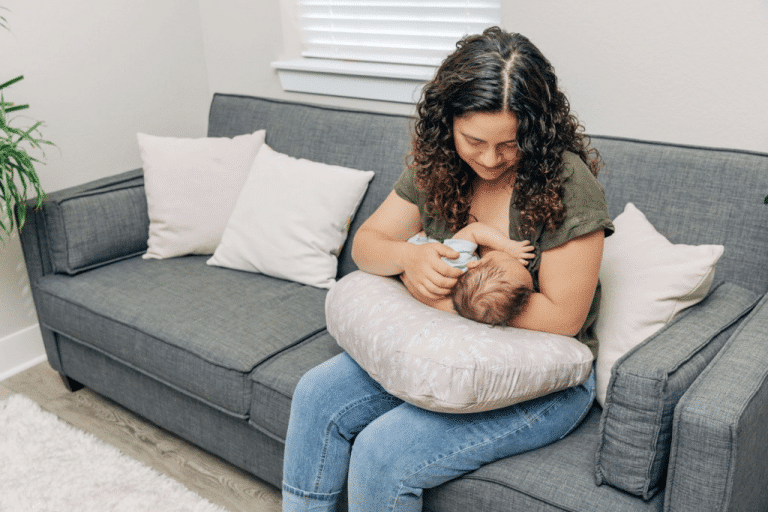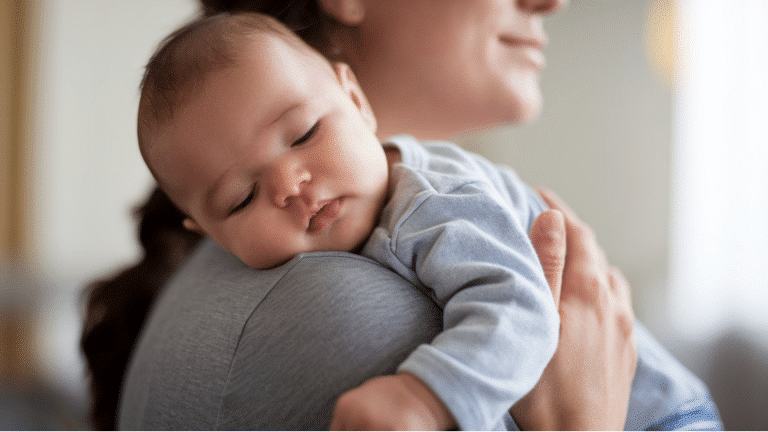Is bedtime at your house all over the place? You’re not alone. Most new parents dream of the day when their little one will go to sleep at a normal hour instead of partying until midnight!
The good news? Your baby will start going to bed earlier – and it might happen sooner than you think. Those short, random sleep bursts do turn into more regular sleep patterns with an actual bedtime.
In this post, we’ll discuss when babies start going to bed earlier, why this shift happens, and how you can help the process along.
You’ll learn simple steps to set up a bedtime routine that works for both you and your baby.
Better sleep is coming – for everyone in your house! Let’s find out how to get there.
How Do New Born Babies Sleep?
Before your baby can settle into an earlier bedtime, it’s important to understand how their sleep works in the first few months.
Newborns need a lot of sleep—usually around 14-17 hours a day—but it’s not in long stretches. They sleep in short bursts of 2-3 hours, often waking to feed.
This sleep pattern happens because their brains haven’t fully developed the ability to distinguish between day and night.
As a result, babies often wake up throughout the night. This can be tough for parents, but it’s a normal part of your baby’s early life.
As your baby grows, it will start to develop its circadian rhythm (the body’s natural 24-hour clock).
What Does an Early Bedtime Mean?
When parents talk about an “early bedtime” for babies, they usually mean putting the baby to bed between 6:00 PM and 7:30 PM.
This might seem very early, especially if you’re used to staying up later yourself!
Many sleep experts say that 7:00 PM is a good target time for most babies. But the right time can be anywhere in that 6:00-7:30 PM range, depending on your baby.
Some signs you’ve found the right bedtime:
- Your baby falls asleep within 15-30 minutes of being put down
- Your baby wakes up happy in the morning
- Your baby doesn’t seem too tired during the day
When Do Babies Start Going to Bed Earlier?
Many parents notice their baby starts to have a more set bedtime around 3-4 months old. This is often the first time babies begin to sleep on a more regular schedule.
During this time, you might see your baby:
- Start to get sleepy at the same time each evening
- Sleep for longer stretches at night (4-6 hours)
- Wake up at more regular times in the morning
By 3-4 months, many babies do well with a bedtime between 7:00 PM and 8:30 PM. This is earlier than the late evening bedtimes that most newborns have.
Why This Change Happens at 3-4 Months
This shift to an earlier, more set bedtime happens for several important reasons:
- Brain Growth: Around 3-4 months, babies begin producing melatonin, the sleep hormone, in a regular pattern, helping them feel sleepy as it gets dark.
- Sleep Cycle Changes: Babies start developing longer, deeper sleep cycles similar to adults, which helps them stay asleep for extended periods at night.
- Less Daytime Sleep: As they transition to 3-4 naps instead of 5-6, babies need more sleep at night to make up for shorter daytime naps.
- More Alert Time: Babies begin staying awake longer between naps, leading to increased tiredness by evening, which prepares them for an earlier, longer sleep.
These natural developments work together to gradually shift your baby toward longer nighttime sleep with an earlier bedtime.
Common Sleep Challenges that Might Arise
While your baby’s sleep patterns mature, you might encounter specific hurdles. Here are some frequent issues and how to address them:
- Night Wakings: Babies might still wake up during the night, even after transitioning to an earlier bedtime, due to hunger, discomfort, or developmental changes.
- Daytime Sleep Struggles: Adjusting to fewer naps can sometimes make babies overtired, leading to difficulty falling asleep or staying asleep at night.
- Sleep Regression: Around 3-4 months, some babies experience sleep regression, where they temporarily have more difficulty sleeping, often due to changes in their sleep cycles or developmental milestones.
- Short Naps: Babies may struggle with taking longer naps, which can lead to an overtired baby by the evening and make it harder to settle for bedtime.
- Difficulty Self-Soothing: Babies at this age are still learning how to self-soothe and might rely on being held or rocked to fall asleep, which can disrupt their sleep routine.
Understanding these challenges can help you respond effectively and support your baby’s transition to more structured sleep patterns.
How Can You Encourage an Earlier Bedtime for Your Baby?
Creating the right conditions can help your baby settle into an earlier bedtime routine. Here are some practical approaches that many parents find helpful:
1. Create a Consistent Bedtime Routine
Starting around 3 months, introduce calming bedtime routines that signal sleep time to your baby.
One important part of this is to begin with a warm bath, as the gentle warmth helps relax your baby’s muscles and signals that bedtime is approaching. Here are some more helpful tips:
Change into special sleep clothes: Use specific pajamas only for bedtime to help create another sleep association.
Read a quiet story: Reading a short, calming story—even for very young babies—helps them unwind, as the soft sound of your voice reading a simple book is soothing.
Stick to a consistent routine: Try to follow the same sequence of activities at approximately the same time each evening for consistency.
2. Optimize the Sleep Environment
The right environment plays a significant role in helping your baby fall asleep easily. Follow these tips to successfully optimize your baby’s sleep Environment
Control light exposure: Dim the lights 30-60 minutes before bedtime and consider using room-darkening curtains to block out light.
Maintain a comfortable room temperature: Ideally, keep the room temperature between 68-72°F (20-22°C) to avoid your baby getting too hot or cold.
Use white noise: A gentle, consistent sound can mask household noises and remind babies of the sounds they heard in the womb.
For babies under 3-4 months who aren’t yet rolling, swaddling can provide added comfort, helping them feel secure and reduce the chances of startling.
3. Watch for and Respect Sleep Windows
Timing is crucial to helping babies transition smoothly to sleep.
Learn your baby’s tired signals: Each baby shows unique cues like rubbing their eyes, turning away from stimulation, or becoming less active.
Prevent overtiredness: When babies become too tired, stress hormones can make it more difficult for them to settle down.
Follow age-appropriate awake times: Young babies (0-3 months) may only stay awake for 45-90 minutes, while older babies can stay awake for 2-3 hours. Be flexible but consistent—adjust bedtime earlier if your baby shows tiredness cues before the usual time.
Why is an Early Bedtime Beneficial for Babies?
An early bedtime offers several key benefits for babies. First, it aligns with their natural sleep cycles, making it easier for them to fall asleep and stay asleep for longer periods.
Babies’ bodies are wired to feel sleepy earlier in the evening, so an early bedtime ensures they’re getting the rest they need when they’re naturally tired.
This deeper and longer sleep not only helps babies feel more refreshed but also supports their physical and mental development.
A predictable bedtime also promotes better sleep habits, which can lead to more restful nights for both the baby and the parents.
Ultimately, an early bedtime is essential for helping babies establish healthy sleep patterns and supporting their growth and well-being.
Conclusion
Babies typically start going to bed earlier, around 3-4 months, when their sleep patterns mature. Recognizing the signs of tiredness and establishing a bedtime routine will help your baby transition to an earlier bedtime.
By being consistent and patient and by responding to your baby’s sleep needs, you can help them settle into a healthier sleep schedule.
Remember, you’re not just helping your baby sleep—you’re building a foundation of comfort, security, and trust.
Parenting is the hardest job in the world, but you’re doing an incredible job. One night at a time, one sweet dream at a time, you’re helping your baby to develop and grow.
If you’re looking for more tips on creating a peaceful bedtime routine, be sure to check out our other parenting guides or join the discussion in the comments below!
Frequently Asked Questions
Is It Normal for My Baby to Sleep Only in Short Bursts?
Yes, newborns typically sleep 2-3 hours at a time due to their need for frequent feedings. Sleep periods naturally lengthen as babies grow.
Is It Safe for My Baby to Sleep on Their Stomach?
No. Always place babies on their backs to sleep to reduce SIDS risk. Use a firm mattress without soft bedding or pillows.
How Can I Help My Baby Learn to Self-Soothe?
Put your baby down drowsy but awake. Use gentle pats and soft sounds to provide comfort while allowing them to fall asleep independently.













